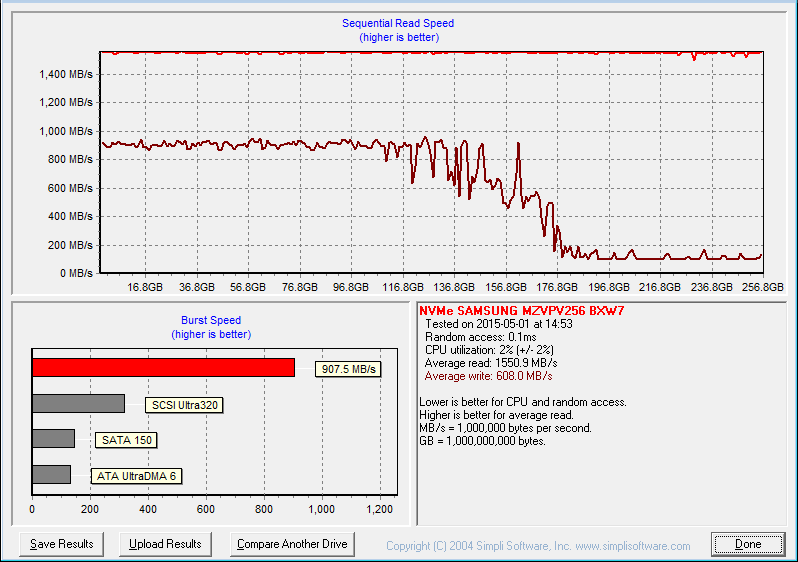Samsung SM951-NVMe Versus AHCI Versus SATA 850 Pro
Why you can trust Tom's Hardware
Sequential Steady State
The two 256GB SM951s deliver nearly identical steady state sequential performance. The same is true for random 4KB steady state. This test stresses architecture and programing more than the physical flash or controller.
The area we want to really focus on is the performance increase over Samsung's 850 Pro 256GB. We often see reader comments that downplay the delta between SATA and PCIe. It's true that, in some applications, one won't be drastically better than the other. It all comes down to the workloads you subject your storage to.
After a reasonable number of sequential and random writes, we tested the SM951-NVMe with HD Tach to watch sequential performance drop off and background activity kick in. Controller makers use proprietary code to handle those tasks. Sometimes the code changes from firmware updates. But most of the time, alterations are implemented with new processor launches.
Samsung's client SSDs are not very aggressive when it comes to TRIM and cleaning dirty cells. Under heavy real-world workloads, we often see performance drop off. All client SSDs transition from fresh-out-of-box to steady state eventually. But the amount of work it takes to get there and the amount of time it takes for the drive to recover is what we're looking for. Samsung's SSDs in particular tend to fall off faster and take longer to recover than other products.
That isn't always a bad thing, though. It means Samsung SSDs wear their flash less because of lower write amplification. In order to clean cells for fresh writes, the entire page of flash needs to be read and the data rewritten without old data that was deleted. Some SSDs are very aggressive with this process, causing the flash to fail faster. Also, the read, erase and write cycle uses power, so aggressive background activity means higher consumption over time. This affects notebook battery life a great deal.
Get Tom's Hardware's best news and in-depth reviews, straight to your inbox.
Current page: Sequential Steady State
Prev Page 80% Read Random Mixed Workload Next Page Random Write Steady State
Chris Ramseyer was a senior contributing editor for Tom's Hardware. He tested and reviewed consumer storage.
-
Amdlova hpv-2560 is rated 1.9A and the another one VPV-2560 is 2.7A Maybe you guys need test the power consumption.Reply -
atheus I find the preamble about comparing these M.2 drives to regular SATA drives a little odd. When SSD's first came out, of course they were compared to HDD's because that was precisely the question of the moment — how much more performance can one expect from the more expensive SSD's. With this new generation of SSD's, it's only natural to want to see them compared to the old, cheaper stuff. How else are we going to evaluate whether it's worth it to upgrade?Reply
If it only resulted in an extra 10% on a real-world test, then it wouldn't make any sense to spend double or more on a NVMe drive. With these solid numbers, though, the massive performance leap will be well worth the cost for those who can afford it. -
TechyInAZ Looks great! NVMe is defiantly the ideal solution for users that need high speed/responsive storage.Reply
I wish you guys would of compared this NVMe SSD to the Intel NVMe SSD that just came out. -
CRamseyer The Intel SSD 750 and the Samsung SM951-NVMe will show up side by side soon in another review.Reply -
CRamseyer Test systems: http://www.tomshardware.com/reviews/how-we-test-storage,4058.htmlReply
All three drives were tested in the PCIe test system. They are the only systems setup for testing queue depths beyond 32. -
dwnelson I'm sad the real world chart is misleading. If you show seconds instead of MB/s you'd see it doesn't justify the cost. Sad.Reply -
BoredErica ReplyThe Intel SSD 750 and the Samsung SM951-NVMe will show up side by side soon in another review.
That is a natural comparison and I look forward to reading it.
